Celebrating Culture, Craft, and Creativity
Chaudhary Foundation, through its UNNATI initiative, has established a unique and first cultural centre with multiple facilities for creative practitioners, tourists, academia, MSMEs, and artisanal communities called Unnati Cultural Village (UCV). This unique platform serves as a long-term engagement and commitment to build and preserve the living intangible facets of culture along with the tangible heritage of the various ethnicities that lend colour to the Map of Nepal.
Unnati Cultural Village is a central force for the creation of sustainable livelihoods through the creation of artistic and artisanal languages through products and services and the preservation of their traditional knowledge systems, which translate to income-generating opportunities for the ecosystems. It is also a singular platform where cross-pollination and collaboration manifest between the stakeholders in the artisanal, institutional, government, and international communities.
UNNATI hopes to establish cultural villages and unique ecosystems in all of Nepal's provinces, promoting the spirit of Unnati (progress and development) throughout the country.
Unnati Cultural Village, Nawalpur
Unnati Cultural Village sits amidst the idyllic setting of the Devchuli and Barchuli hills of Nawalpur, Nepal. Here, arts, crafts, and cultural hospitality come together to celebrate the ethnic diversity of Nepal. From an art hotel that reveals the true beauty of traditional architecture to a Tharu village, UCV is integrally built around the idea of housing artists and hosting residencies, exhibitions, and events to cater to the creative and cultural industries.
inspiring arts and crafts spaces
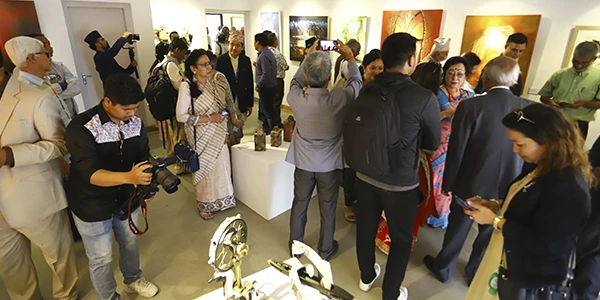
Kala Dirgha: An Art Gallery
Kala Dirgha is an aspirational art gallery that strives to become a centre of artistic excellence in the country. Artists, writers, and creatives can use this space to display the work they have developed either in residency at UCV or beyond. Set amidst greenery in a versatile indoor-outdoor setting, Kala Dhirgha is a vital space where artists and the local communities of Nawalpur and neighbouring areas can connect through art.
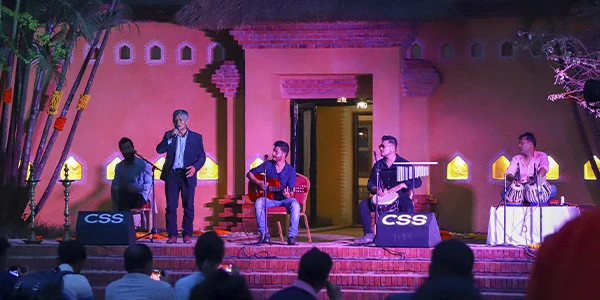
Leela and Kala Rangamanch: Amphitheatres
As the name suggests, the Rangamanch (amphitheatre) encompasses two performing spaces: Leela Rangamanch and Kala Ghar Rangamanch. The Rangamanch is an open-air venue that is used for various programmes, cultural performances, and events. The walkways to both Rangamanch areas take visitors to an open-air museum through a route of lotus ponds and organic gardens.
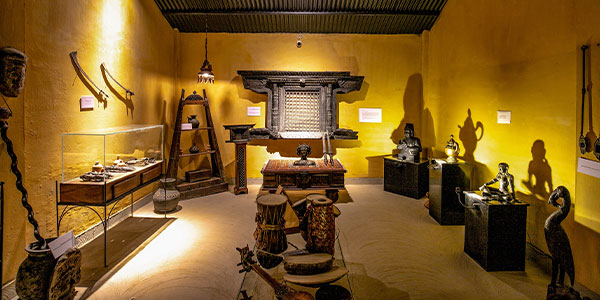
Sanghralaya: A Collection of Nepali Crafts
The craft museum tells the story of Nepali artefacts through a visual narrative that brings to light the ancient, mediaeval, and modern eras of the ethnic group. Based on this concept of a timeline, the museum strives to showcase the relevance of history, demography, and socio-economic factors in the evolution of arts and crafts in Nepal. The collection reflects the continuing traditions of handicrafts and handlooms, with artefacts such as textiles, metal crafts, sculpture, jewellery, silver work, stonework, woodwork, folk and tribal paintings, bamboo crafts, terracotta, figures, and many more.
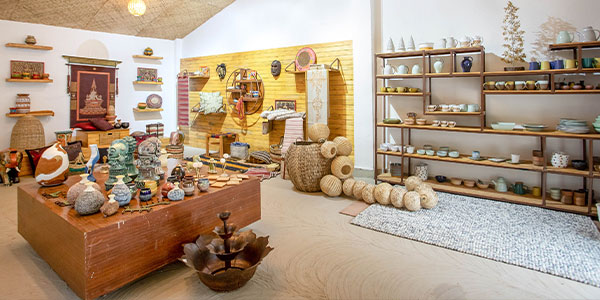
Unnati Baazar: Craft Retail
Craft retail is carefully curated to sell authentic art and goods that are handmade within the Unnati premises. Made using skills and techniques that are passed down through generations, our products include home furnishings, decorative accessories, kitchen and bathroom amenities, and other lifestyle items. In the next phase of its outreach, these products would be sold widely both inside and outside the country, linking and creating networks of domestic and international markets.
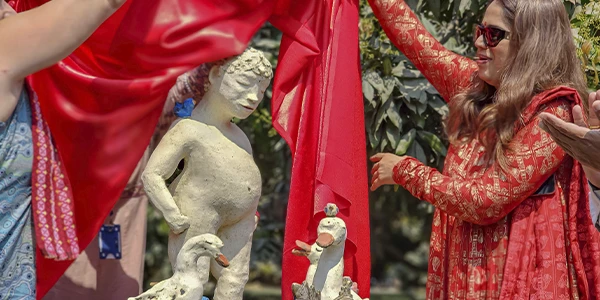
Kala Batika: An Open Air Museum
Kala Batika exhibits exquisite pieces of artwork in ceramic, glass, clay, and stone created by renowned Nepali and international artists. This open-air museum seamlessly blends into UCV’s natural environment and is also a space for our artists-in-residence to showcase the work created during their time in Nawalpur.
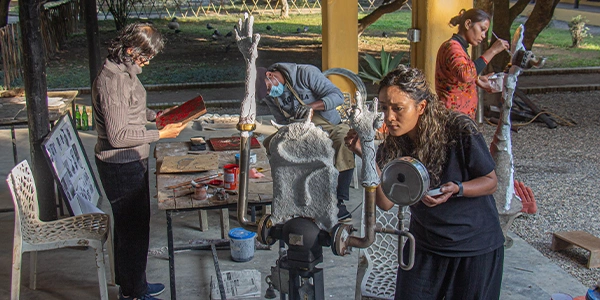
Shilpakutir: Open Studios
The Shilpakutir provides space for artisans to practise woodworking, pottery, paper art, folk paintings, embroidery, knitting, and macramé. Each of the studios is equipped with professional quality materials and tools for craftspeople. The studio also provides workshops for visitors and local communities. The facilities are meant for mass production and the creation of products for sale at the Atelier.
cultural hospitality
UCV’s hospitality is unmatched, providing a range of accommodations from high-end luxury to traditional, a restaurant with a unique menu, and large banqueting facilities.
Eat & Drink
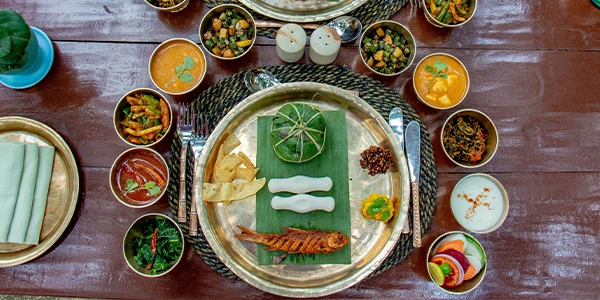
Tharu Gaam
The Tharus, indigenous to Nepal’s Terai and inner Terai regions, are creative people who integrate art into daily life, from home design to cuisine. Nawalpur is home to Tharu, Magar, Brahmin, and Thakuri communities. Unnati Cultural Village (UCV) celebrates and preserves Nawalpur’s rich Tharu culture.
“Gaam” means village in the Tharu language. Tharu Gaam offers visitors an immersive cultural experience through cuisine, art, and artifacts that reflect the Tharu way of life. It serves as a living museum showcasing traditional practices, festivals, stories, customs, and cuisine.
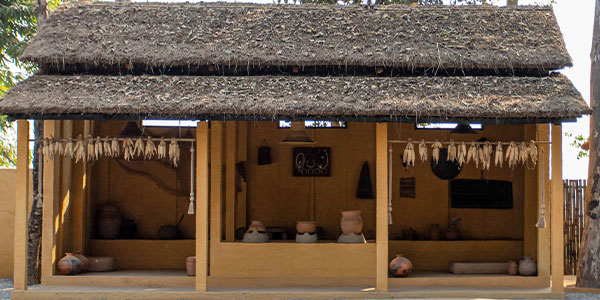
Bahari: Live Kitchen
The Tharu food culture is largely characterised by the fertile flooded plains, forests, and habitats they live in. Anadi, a sticky rice, is traditionally grown by Tharu communities. Fish, crabs, river escargot, and mussels from the rivers and water bodies are central to the Tharu food culture.
Bahari presents the flavour and spices of Tharu recipes that have been passed down through generations. The kitchen offers on-the-spot cooking, where guests can experience traditional culinary practises infused with local ingredients and vegetables from their organic garden. Meals are served with various cultural musical and dance performances.
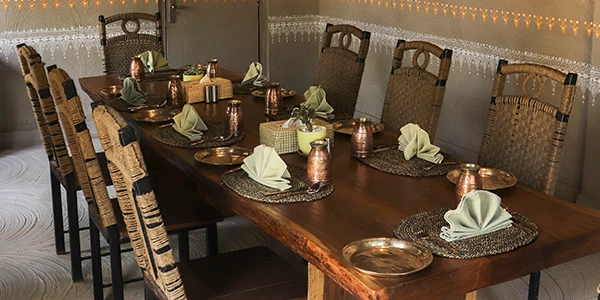
Bada Ghar: Private Dining
Stories recount that Nawalpur’s Tharus used to live in Bada Ghar or longhouses. They used to live with big families of over 30 members, spanning four generations. The household members pooled their labour force, contributed their income, shared the expenditure, and used to have one kitchen. When families were forced to resettle, some of these Bada Ghar households broke up into smaller units. The traditional lifestyle of the Tharu community is slowly disappearing; thus, the essence of our Bada Ghar private dining area is to remember these lost practises of the Tharu people.
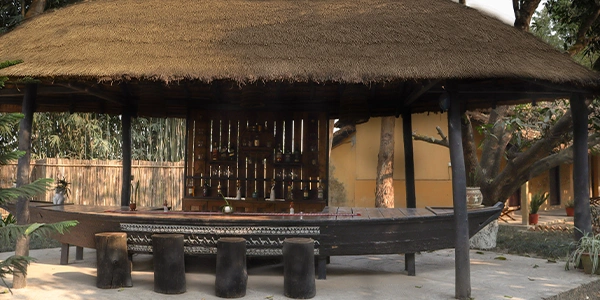
Gadala Mod: Bar & Lounge
Alcoholic drinks have long been incorporated into ceremonies and celebrations throughout many Nepali communities. The best kinds of alcoholic beverages are often homemade, and Nepal has plenty to offer. Gadala Mod is an enchanting indoor-outdoor bar next to the Dabali with a backdrop of lotus ponds, and litchi and mango trees. Gadala Mod offers a wide range of beverages, along with hand-crafted local wine, inspired by the Tharu community.
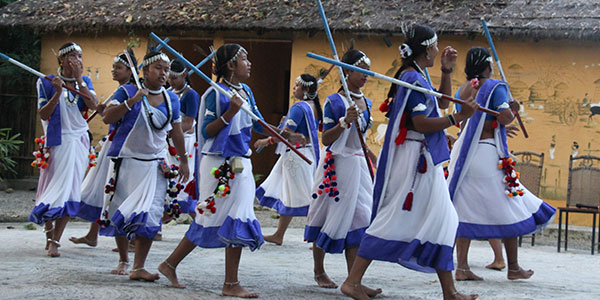
Dabali: Cultural Performance Area
The Dabali is an open-air stage for cultural performances, theatre, music, and dance. The Dabali sits at the centre of Tharu Gaam, connecting cuisine, art, culture, and tradition.
Stay
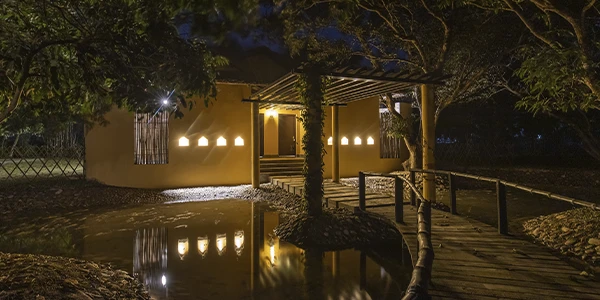
Bodhi Ban: Artist Residency
Bodhi Ban provides a space for artists to be inspired and express themselves with freedom and creativity. UCV offers a tranquil and inspiring environment to get one’s creativity flowing, as elements of culture, engagement with nature, and meditation space serve as sources of inspiration.
Rooms
2 deluxe bedrooms with natural open-air bathrooms and a private space for relaxation.
Open Courtyards
The open courtyards serve as a place to imagine and create, relax, read, and write.
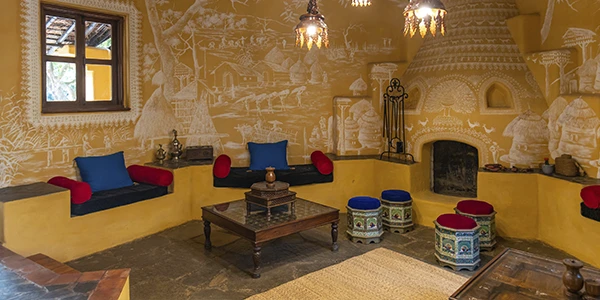
Kala Ghar: An Art Hotel
The space is an exclusive boutique hotel with high-end craft interiors, charming decor, and a homely feel. A stay at the Kala Ghar is sure to be a memorable experience for any traveller or art enthusiast.
Rooms
1 master bedroom and 2 deluxe rooms; the rooms are rented out to guests who are seeking the rejuvenation of a mango grove in an authentic Nepali-style building.
Artspace
The open space is used as an art laboratory for art enthusiasts to dabble with colours and imagination inspired by the idyllic setting. The artworks created can be taken back as souvenirs.
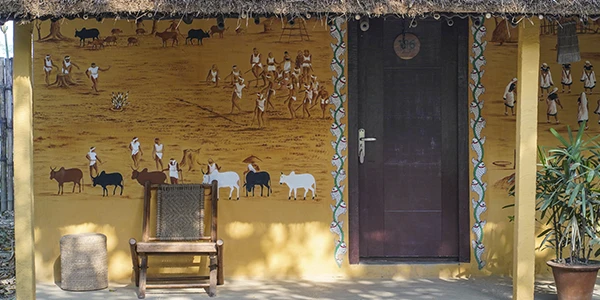
Tharu Ghar: Cultural Stay
Beautiful, quaint, and cosy, Tharu Ghar is built in a village setting with thatched roofing and walls adorned in Tharu art. Each room has a spacious open-air bathroom.
Rooms
The 5 rooms in the Tharu Ghar are each named after festivals celebrated by Nawalpur’s Tharu community:
- Jitiya: A festival celebrated by married women
- Faguwa: Holi, or the festival of colours
- Maghi: Tharu New Year
- Anat: Historical Shepherd Game
- Amosa: Ancestor Worship Festival
2BHK
UCV offers 2 BHK spaces for visiting artists, groups, and trainers who are willing to stay for an extended period of time. Residents will be provided with housing, studio space, and food in a traditional atmosphere. Space provides an opportunity for residents to participate in all aspects of our programme and learn more about Nepali arts and crafts practises.

